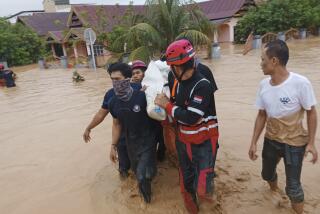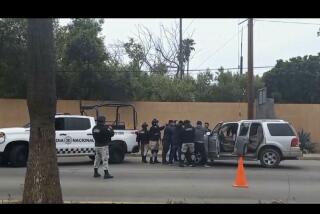U.S., Kazakhstan strengthen cooperation on nuclear security
The U.S. and Kazakhstan announced Thursday that they will enhance their collaboration in the realm of nuclear security and nonproliferation.
Kazakh President Nursultan Nazarbayev is among the more than 50 world leaders who have traveled to Washington for the Nuclear Security Summit, which begins Thursday night with an event at the White House hosted by President Barack Obama.
“The Republic of Kazakhstan and the United States of America have confirmed a shared commitment to implementing practical measures to strengthen the nuclear nonproliferation regime and enhance nuclear security,” the two governments said in a joint statement released by Nazarbayev’s office.
The document refers to steps taken by Kazakhstan to enhance safety protocols for stored nuclear materials and cites “the successful elimination of all fresh highly enriched uranium (HEU) from the WWRK research reactor in Kazakhstan by downblending this material at Kazakhstan’s nuclear fuel factory.”
Both governments also note “the commitments of Kazakhstan to return the HEU spent fuel to the Russian Federation as soon as possible,” with the effect of eliminating all highly enriched uranium from the facility.
The statement expresses satisfaction with U.S.Kazakh joint efforts to establish the Nuclear Security Training Center, which is to “offer training in the areas of nuclear nonproliferation; material protection, control, and accounting; and countering the illicit trafficking of nuclear and other radioactive materials.
Work on the facility began late last year and the center “will be operational by the end of calendar year 2016,” according to the text.
“Kazakhstan and the United States further commit to working together on guard force training, inventory management systems, site and transportation security, cyber security, and cooperation to enhance the global nuclear detection architecture,” the two governments said.
Kazakhstan cochairs with Japan the organization pushing for implementation of the Comprehensive Nuclear Test Ban Treaty.
When the collapse of the Soviet Union in 1991 left Kazakhstan in possession of the world’s fourthlargest nuclear arsenal, the government of the newly independent nation ordered the immediate dismantlement of the stockpile.
In 2006, Astana ratified the Central Asian NuclearWeaponFree Zone and last year, Kazakhstan became the home of the International Atomic Energy Agency’s Low Enriched Uranium Bank, which is meant to ensure a supply of fuel for peaceful nuclear power.








